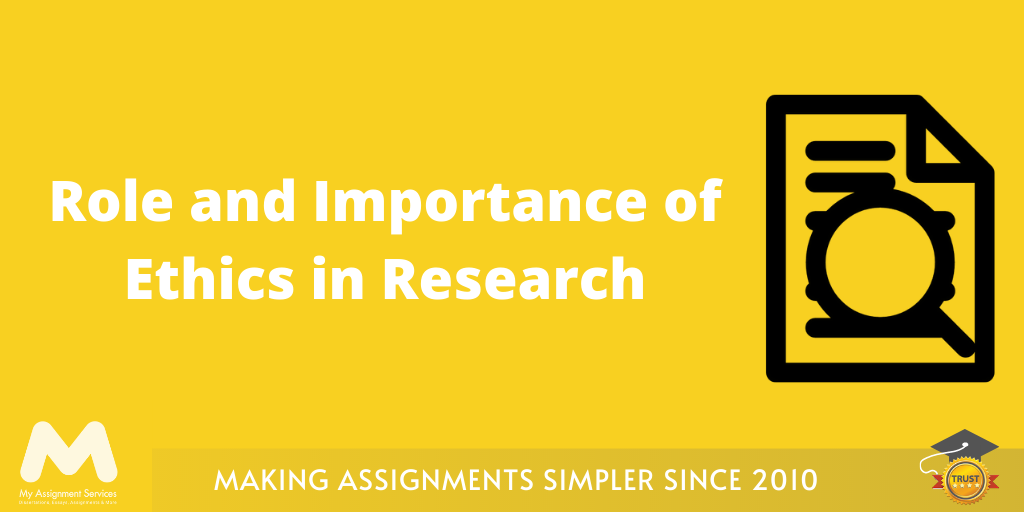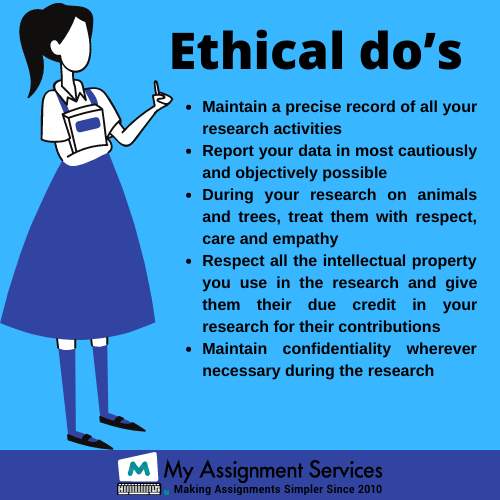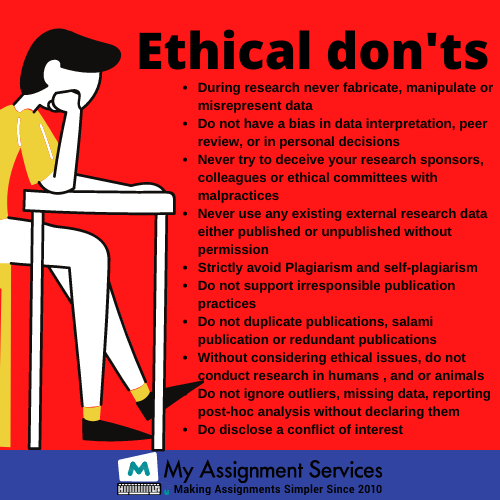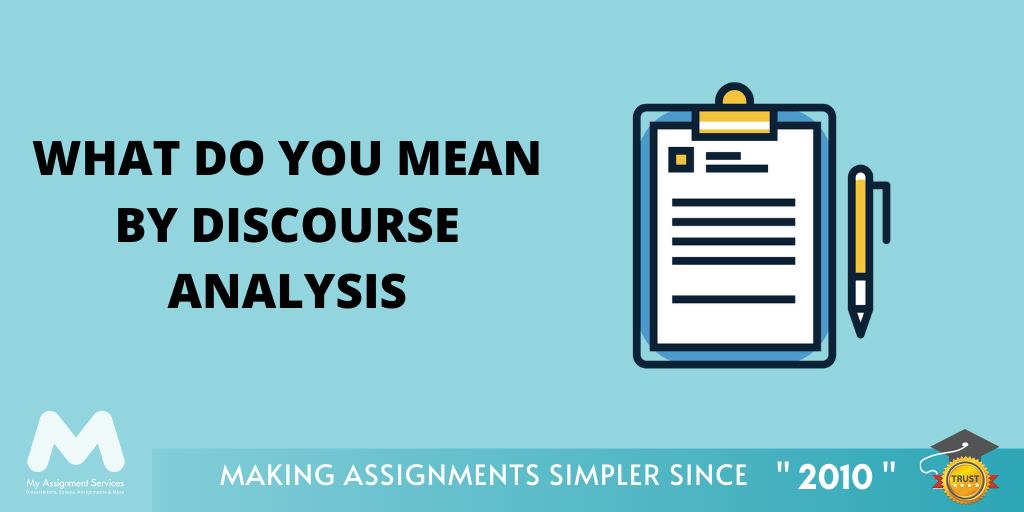
When we think of ethics (morals), what pops up in our minds? Most of us think of ethics as rules for distinguishing between right and wrong, like the Golden Rule- Do unto others as you would have them to do unto you, the Hippocratic Oath- First of all, do no harm, Teen Commandments- Thou Shalt not Kill, and many more similar to these. The most common way to define ethics is the norms of conduct that differentiate between acceptable and unacceptable behavior.
Know more about the topic by availing of research ethics assignment help at My Assignment Services.
Most of us have learned about it at home, at school, in church, or in other social settings. Although most of us acquire a sense of right and wrong during our childhood, moral development occurs throughout our lives and we pass through different phases of growth as we mature. Ethical norms are so vague that one might be tempted to regard them as simple common sense. On the contrary, if ethics/morality were nothing but common sense then why there are so many ethical disputes and problems in our society? Think about it.
What are Ethics?
In simple terms, ethics are a set of rules, written and unwritten, that govern our expectations along with others’ behavior. This set of rules guides us on how we expect others to behave, and why. While there are broad agreements on some ethical values such as murder is bad there is also a wide range of variations on how exactly to interpret these values in practice.
What are Research Ethics?
When we think of research ethics, we think about problems that arise when research comprises human or animal subjects. While these issues are indeed a key part of research ethics it is not always the case. It is a wider issue about standards of conduct and incorporates aspects like the importance of publishing findings transparently, not plagiarising other’s work, and not falsifying work.
It is the set of ethics that guides how scientific and various other research are performed at research institutions like universities and the way it is disseminated. Read the blog to learn more about research ethics and how you can make certain that your research is compliant.


Do you want to ensure that your research is compliant? Visit My Assignment Services to get research ethics assignment help.
Significance of Research Ethics: There are Several Reasons
- It promotes the aims of the research, like expanding knowledge.
- It supports the required collaborative work values, like mutual respect and fairness. It is important because scientific research is dependent upon collaboration between researchers and groups.
- The set of rules ensures that researchers can be held accountable for their actions. Various researchers are supported by public money, and regulations on conflict of interest, misconduct, and research incorporating humans or animals are essential to ensure that money is spent appropriately.
- Research ethics means that the public can trust research. For people to support and fund any research, they have to be confident in it.
- It supports essential social and moral values like the principle of doing no harm to others.
Learn How to Acknowledge Any Source of Information Using the APA 7th Style.
Download Now
Ethical Code
Government agencies who fund or commission research often publish codes of conduct for researchers, or codes of ethics, for example, the Australia New Zealand Food Standards Code (the Code) sets legal requirements for the labeling, composition, safety, handling, and primary production and processing of food in Australia. Some codes of ethics may have the force of law behind them, while others may simply be advisable.
Do not get confused with the various codes. Just visit My Assignment Services and avail of research ethics assignment help experts to eliminate any possibility of confusion on the topic.
Ethical Principle
The following is a rough and general summary of some ethical principles that different codes address:
Honesty and Integrity
It means that researchers need to report their research honestly, and this applies to the various methods used in the process, the data, results, and whether they were previously published it. Researchers must not even try to make up any data, comprising extrapolating unreasonably from some of their previous results, or commit anything that could be construed as trying to mislead anyone. It is better to undersell than exaggerate their findings. When a researcher is working with others, they should keep to any agreements, and act sincerely.
Objectivity
A researcher should avoid any bias in any aspect of his/her research comprising design, data analysis, interpretation, and peer review for example you should not recommend your known as a peer reviewer, and avoid inadvertently excluding any groups from your research. It also signifies that you are supposed to disclose any personal or financial interests that may affect your research.
Carefulness and Openness
Utmost care should be taken while carrying out research to avoid careless mistakes. Do not forget to review your work critically analyze the results for its credibility, and keep full records. Also, be prepared to share the data and results, along with any developed tools, whilst publishing your findings. Be open to criticism and new ideas.
Respect for Intellectual Property
Avoid plagiarism, or copying others' work to pass it off as your own. Always seek permission before using other tools or methods, unpublished data, or results. It includes issues such as copyrights and patents, together with different forms of intellectual property, and always acknowledges contributions to your research. If you are in any doubt, acknowledge, to avoid any risk of plagiarism.
Confidentiality
Respect anything that has been provided to you in confidence. Follow guidelines on the protection of sensitive data like patient records.
Visit My Assignment Services to get a stone-clad confidentiality policy to tackle all the issues that come with it. Avail of research ethics assignment help, anytime without any worry.
Responsible Publication
Do not just publish to advance your career but to advance the state of your research and knowledge. This also means you should avoid publishing something that is not new.
Legality
Be aware of the laws and regulations that govern your work.
Animal Care
If your research requires animals as subjects, ensure that your experiments are both necessary and well-designed. Show respect for the animals and make certain that they are properly cared for.
Human Subjects Protection
If your research involves people as subjects make certain that the possibility of harm is reduced to a minimum, and maximise the benefits for the participant and others. This means avoiding exposing people to more tests than are necessary to fulfill your research aim. Respect human rights including the right to privacy and autonomy. Take particular care with vulnerable groups including but not limited to, children, old people, especially abled, etc.
Ethics Committee and its Role
Most universities have an ethics committee to scrutinize all research proposals to make certain that they do not raise any ethical issues. There is a standard form for the completion of ethical approval, everywhere, for how participants will be recruited, and what steps will be taken by researchers to ensure that they have provided informed consent.
The role of the ethics committee is to consider that whatever research you are conducting is appropriate and proportionate to your research aims. Furthermore, if the proposed research raises ethical issues, the committee will ask the researchers to inspect the issue and consider whether they could do it differently. The committee may also suggest alternative ways suitable for the target group, or additional precautions to take.
Research can’t be started until you have been granted ethical approval, which is granted formally, together with an approval number. It is important to include details of the ethical approval, and this number whilst publishing your research, thesis, or journal articles.
In case of any doubt on research ethics and its various principles, getting assistance from a research ethics assignment helps experts for plagiarism-free along with error-free content on time. We take care of all the ethical issues such as confidentiality etc. There are numerous professionals to help you round the clock. Just visit My Assignment Services.
After all, as a researcher, you should always consult more experts to avoid any confusion, and it is our interest to promote research ethics and support the reputation and integrity of research.
Related Study Materials
Our Experts can answer your Assignment questions instantly.
Ask Question0 Comment
Get It Done! Today
1,212,718Orders
4.9/5Rating
5,063Experts













Loved reading this Blog? Share your valuable thoughts in the comment section.
Add comment